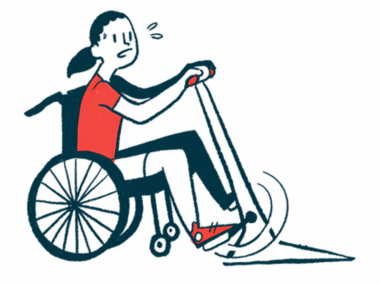MS Advocacy Gives Me Strength and Purpose
Written by |

I want to help in any way I possibly can.
My lonely confusion in the early days after being diagnosed with aggressive relapsing-remitting multiple sclerosis was mentally and physically paralyzing. However, this column isn’t about how “Hurricane MS” battered my body. Instead, it’s about why I chose to channel my struggles into helping others.
The loneliness I felt was overwhelming. It was as though a black hole had erupted and was growing with every new symptom.
I’m a scientist. Five years before Hurricane MS blew into my life, I was studying MS while working toward my undergraduate degree in biomedical science. My final research project was based on neurological conditions. The irony is not lost on me.
It meant that I understood the condition, so when my first MRI scan reports referred to demyelination, the cogs in my mind began whirring. My doctors originally suspected a brain tumor, but considering that demyelination is a hallmark of MS, I began to wonder.
In hindsight, the experience was humbling. Having that understanding as a patient didn’t affect the disease’s onset. My self-awareness and insight dissipated, like rain clouds after a storm.
How does one handle it? I turned to my faith, and hoped and bargained that my condition wasn’t what we thought. I hoped with every fiber of my being that the scans and tests were wrong.
I even began to believe this when my symptoms resolved and I was discharged from the hospital. But the harsh, icy winds of reality whipped me square in the face when my symptoms returned in full force, and then worsened. They left me paralyzed before I was able to receive treatment.
During this time, my self-awareness was replaced with complacency, and I retreated into myself. It was almost as though I didn’t notice what was happening, because the onset was so slow. It wasn’t as though a switch had been flipped overnight; it was more like a grandfather clock was slowly winding down, with the delay between each tick growing longer and longer before finally stopping entirely. My body and mind compensated for the changes without me noticing.
My family, who didn’t see me every day, eventually pointed out to me what was happening. They advocated for me when I couldn’t advocate for myself.
That is why I now choose to use my voice to spread awareness. I know how the crushing weight of uncertainty feels. As patients, it can be hard to possess the clarity that hindsight gives when we’re dealing with health challenges.
I began to write some articles for the U.K.’s MS Society — not only to process my diagnosis, but also to raise awareness and understanding. I enrolled in a young patient advocacy course run by the European Patients’ Forum, and attended the organization’s 2019 European Congress on patient involvement in Brussels.
I channeled my frustration with the hand I’d been dealt into something positive and useful.
I passionately believe that something positive should come from the aggressive nature of my Hurricane MS. The onset was undeniably one of the hardest periods of my life. I would never wish that experience on anyone.
If I can use my experiences to shine a flicker of light on another person’s darkest moments, then I can believe they happened for a reason. I can believe that there is a silver lining in even the worst moments of someone’s life, and at least some order to life’s chaos.
***
Note: Multiple Sclerosis News Today is strictly a news and information website about the disease. It does not provide medical advice, diagnosis, or treatment. This content is not intended to be a substitute for professional medical advice, diagnosis, or treatment. Always seek the advice of your physician or other qualified health provider with any questions you may have regarding a medical condition. Never disregard professional medical advice or delay in seeking it because of something you have read on this website. The opinions expressed in this column are not those of Multiple Sclerosis News Today or its parent company, Bionews, and are intended to spark discussion about issues pertaining to multiple sclerosis.







Alison McLachlan
This has to be THE best article I have read on MS - I would like to thank you so much for writing in such a positive manner about a negative subject to every one of us, including myself, that it touches. You have most definitely shone a flicker of light on my life, I hope that your situation is full of hope and flickers day and night.